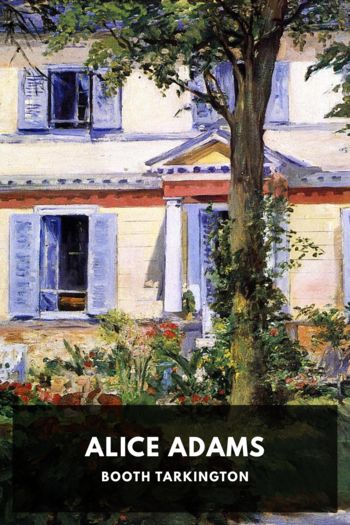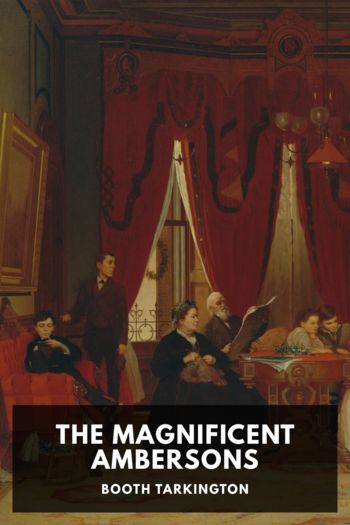Alice Adams by Booth Tarkington (ebook reader macos TXT) 📕

- Author: Booth Tarkington
Book online «Alice Adams by Booth Tarkington (ebook reader macos TXT) 📕». Author Booth Tarkington
“Indeed it is,” she agreed with herself, never failing to continue her murmur of laughter. “That’s what I’ve always told Alice; but she never sees anything good in herself, and she just laughs at me when I praise her. She sees good in everybody else in the world, no matter how unworthy they are, or how they behave toward her; but she always underestimates herself. From the time she was a little child she was always that way. When some other little girl would behave selfishly or meanly toward her, do you think she’d come and tell me? Never a word to anybody! The little thing was too proud! She was the same way about school. The teachers had to tell me when she took a prize; she’d bring it home and keep it in her room without a word about it to her father and mother. Now, Walter was just the other way. Walter would—” But here Mrs. Adams checked herself, though she increased the volume of her laughter. “How silly of me!” she exclaimed. “I expect you know how mothers are, though, Mr. Russell. Give us a chance and we’ll talk about our children forever! Alice would feel terribly if she knew how I’ve been going on about her to you.”
In this Mrs. Adams was right, though she did not herself suspect it, and upon an almost inaudible word or two from him she went on with her topic. “Of course my excuse is that few mothers have a daughter like Alice. I suppose we all think the same way about our children, but some of us must be right when we feel we’ve got the best. Don’t you think so?”
“Yes. Yes, indeed.”
“I’m sure I am!” she laughed. “I’ll let the others speak for themselves.” She paused reflectively. “No; I think a mother knows when she’s got a treasure in her family. If she hasn’t got one, she’ll pretend she has, maybe; but if she has, she knows it. I certainly know I have. She’s always been what people call ‘the joy of the household’—always cheerful, no matter what went wrong, and always ready to smooth things over with some bright, witty saying. You must be sure not to tell we’ve had this little chat about her—she’d just be furious with me—but she is such a dear child! You won’t tell her, will you?”
“No,” he said, and again applied the handkerchief to his forehead for an instant. “No, I’ll—” He paused, and finished lamely: “I’ll—not tell her.”
Thus reassured, Mrs. Adams set before him some details of her daughter’s popularity at sixteen, dwelling upon Alice’s impartiality among her young suitors: “She never could bear to hurt their feelings, and always treated all of them just alike. About half a dozen of them were just bound to marry her! Naturally, her father and I considered any such idea ridiculous; she was too young, of course.”
Thus the mother went on with her biographical sketches, while the pale young man sat facing her under the hard overhead light of a white globe, set to the ceiling; and listened without interrupting. She was glad to have the chance to tell him a few things about Alice he might not have guessed for himself, and, indeed, she had planned to find such an opportunity, if she could; but this was getting to be altogether too much of one, she felt. As time passed, she was like an actor who must improvise to keep the audience from perceiving that his fellow-players have missed their cues; but her anxiety was not betrayed to the still listener; she had a valiant soul.
Alice, meanwhile, had arranged her little roses on the table in as many ways, probably, as there were blossoms; and she was still at it when her father arrived in the dining-room by way of the back stairs and the kitchen.
“It’s pulled out again,” he said. “But I guess there’s no help for it now; it’s too late, and anyway it lets some air into me when it bulges. I can sit so’s it won’t be noticed much, I expect. Isn’t it time you quit bothering about the looks of the table? Your mother’s been talking to him about half an hour now, and I had the idea he came on your account, not hers. Hadn’t you better go and—”
“Just a minute.” Alice said, piteously. “Do you think it looks all right?”
“The flowers? Fine! Hadn’t you better leave ’em the way they are, though?”
“Just a minute,” she begged again. “Just one minute, papa!” And she exchanged a rose in front of Russell’s plate for one that seemed to her a little larger.
“You better come on,” Adams said, moving to the door.
“Just one more second, papa.” She shook her head, lamenting. “Oh, I wish we’d rented some silver!”
“Why?”
“Because so much of the plating has rubbed off a lot of it. Just a second, papa.” And as she spoke she hastily went round the table, gathering the knives and forks and spoons that she thought had their plating best preserved, and exchanging them for more damaged pieces at Russell’s place. “There!” she sighed, finally.
“Now I’ll come.” But at the door she paused to look back dubiously, over her shoulder.
“What’s the matter now?”
“The roses. I believe after all I shouldn’t have tried that vine effect; I ought to have kept them in water, in the vase. It’s so hot, they already begin to look a little wilted, out on the dry tablecloth like that. I believe I’ll—”
“Why, look here, Alice!” he remonstrated, as she seemed disposed to turn back. “Everything’ll burn up on the stove if you keep on—”
“Oh, well,” she said, “the vase was terribly ugly; I can’t do any better. We’ll go in.” But with her hand on the doorknob she paused. “No, papa. We mustn’t go in by this door. It might look as if—”
“As if what?”
“Never mind,” she said. “Let’s go the other way.”
“I don’t see what difference it makes,” he grumbled, but nevertheless followed her through the kitchen,





Comments (0)